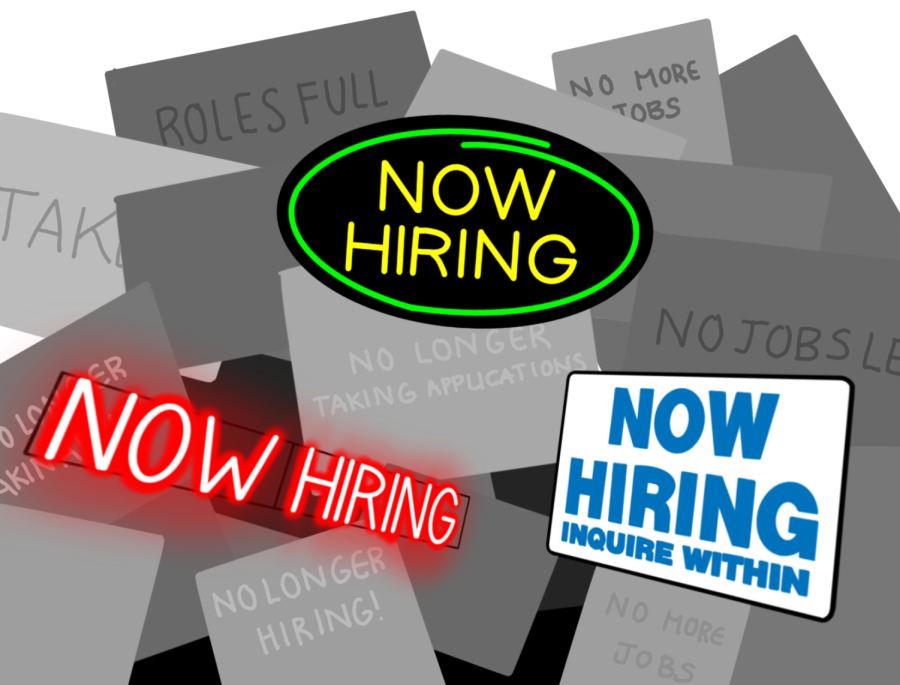Student internships affected by recent economic downturn
This spring, recent bank failures and layoffs at large Silicon Valley technology companies have trickled down to create fewer high school internship opportunities.
According to the Wall Street Journal, bank failures are an indication of an economic recession, a prolonged period of negative gross domestic product growth with a rise in unemployment due to decreased demand for goods. Although some local businesses still offer internships for high school students, options — especially through the district — have become scarcer.
According to Work Experience teacher Rachel Kaci, during COVID-19, most work-experience opportunities and industry-specific positions weren’t being advertised to high schoolers. “A lot of students (did) their own cold-calling (of) local university professors or local companies to say ‘I’m really interested in biotech or biomed or insert-the-area-of-interest,’ and students were getting responses,” she said.
Even after the pandemic, cold-calling has retained its importance: Students must continue to take take initiative to get industry-specific internships. Even then, many businesses may not respond, which Kaci attributes to students’ lack of continued inquiry. “The cold-calling should not be sending an email once and never following up,” she said. “(Managers) care about refilling the (supplies) for the next day so they can actually serve their (customers). They’ll just work overtime themselves in order to fill that hole. They (cannot) even dedicate one hour to an interview or (call) back to say you got the job.”
Economic instability
Business, Entrepreneurship and Math Program founder Cristina Florea recognizes that the ongoing layoffs and economic instability have contributed to the diminishing number of high school internships. “At this time, the companies need to focus on their own mission and make sure they’re progressing,” she said. To maintain sufficient funds, companies often eliminate opportunities for high schoolers.
The BEAM Program used to allow Gunn students to apply business knowledge to the real world by connecting them with companies that were offering internships. Most companies were based in Silicon Valley, including TIBCO Inc., AppLovin, Google, Facebook, Cisco and Brainvyne. According to Tom Berquist, chief financial officer at the Cloud Software Group, TIBCO used to offer around a dozen Gunn students internships in the finance industry. “When the BEAM Program wound down (for Gunn), we also wound down our use of high school interns,” he said. “We do still use college interns, but not as many as we would if the economy was better.”
Retirements and post-COVID-19 layoffs have also led to fewer internship opportunities for high schoolers. Kaci explained that, in some cases, the high school internship director may retire or be laid off, and the company may not appoint another employee to continue program oversight. “The bottom line for a company is to make money, and so the first place they’re gonna pull from is (high school internship programs),” she said. The number of available STEM internships have also begun to decrease due to similar problems. According to Kaci, the Lockheed Martin internship offered fewer spots when the internship director retired after the COVID-19 lockdown. The internship positions available at Lockheed Martin for rising seniors decreased from six positions pre-pandemic to three during the pandemic to two spots currently. “Six to two in five years is a pretty significant drop in opportunities, especially at such a coveted (company) like Lockheed Martin,” she said.
Students have witnessed the competition for internship positions. “I feel (that) especially (because we are back) in person, the opportunities come to you through flyers and social media,” sophomore Anriya Wang said. “They are more available (and) more people notice it.”
Lack of internship culture
Companies are often hesitant to have high school interns because of the lack of high school internship culture in general. This problem was present even before COVID-19, according to Florea. “(Companies) think of college internships, but they never think of high school internships,” she said. “So even when the economy was going well, it was still hard to get internships for high school students.”
Although many local service-oriented businesses are providing opportunities for high school students to work or intern, the current economy and the impacts of the post-COVID-19 economy are hindering businesses’ abilities to create high school student job and internship opportunities. While some companies are still offering such positions, the fewer opportunities available make them more competitive.
Despite hesitations, high school interns can bring value to a company, according to Florea. “The CFO of TIBCO, now acquired by Citrix, was saying that some of the high school interns actually produce more results than some of the actual adult employees,” she said.
Your donation will support the student journalists of Henry M. Gunn High School. Your contribution will allow us to purchase equipment and cover our annual website hosting costs.

Senior Charlotte Qian is a managing editor for The Oracle. In her spare time between writing articles and designing layouts, she enjoys playing with her...




